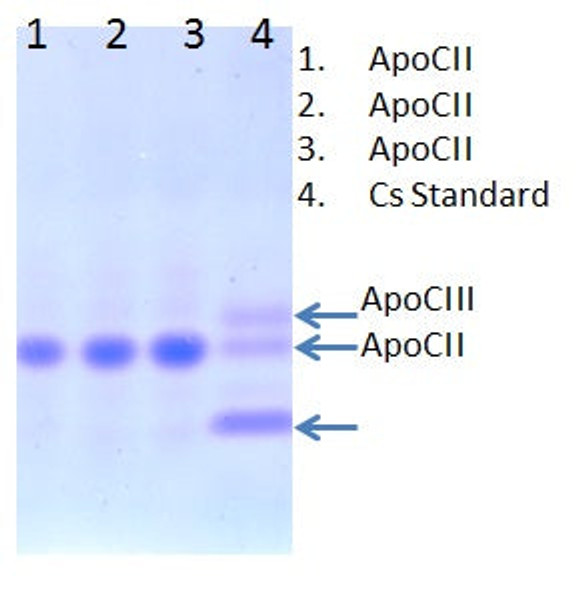Description
Water-Soluble Human Apolipoprotein B-100, 50% glycerol | ABMC-P07
| Concentration: | 1 mg / ml, determined by the Lowry method |
| Source: | From fresh human plasma that has tested negative for Hepatitis C, HIV-I and HIV-II antibodies as well as Hepatitis surface antigens. |
| Purification: | After series ultracentrifugation, Low Density Lipoprotein (LDL) is isolated from human plasma. Water-soluble Apo B-100 is prepared from delipidated LDL. |
| Purity: | ≥ 98% by SDS-PAGE |
| Buffer: | 20 mM Tris-HCl, 140 mM NaCl, 0.5 mM EDTA, 0.02 % NaN3, pH 7.4; Preserved with 50% glycerol. |
| Storage: | -20°C for long-term storage, 4°C for short- term storage. Aliquot to avoid repeated freezing and thawing. |
IMPORTANCE
ApoB exists in human plasma in two isoforms, ApoB-48 (Chen et al., 1987) and Apo B-100 (Wei et al., 1985, Yang et al., 1986a; 1989a,b; 1990; Chen et al., 1986; Yang et al., 1990, Yang and Pownall, 1992). Apo B-100 is the major physiological ligand for the LDL receptor. Apo B-100 is a large monomeric protein, containing 4536 amino acids (m.w. 515 kDa, Yang et al., 1986b).
Apo B-100 is synthesized in the liver and is required for the assembly of VLDL. It is found in LDL and VLDL after the removal of the Apo A, E and C. Apo B-48 is present in chylomicrons and their remnants. It is essential for the intestinal absorption of dietary lipids. Apo B levels correlate with the risk of coronary disease.
The Apo B protein is directly involved in the retention of LDL with the arterial wall (Olofsson and Boren, 2012). Apo B-48 is synthesized in the small intestine. It comprises approximately half of the N-terminal region of ApoB-100 and is the result of posttranscriptional mRNA editing by a stop codon in the intestine not found in the liver.










